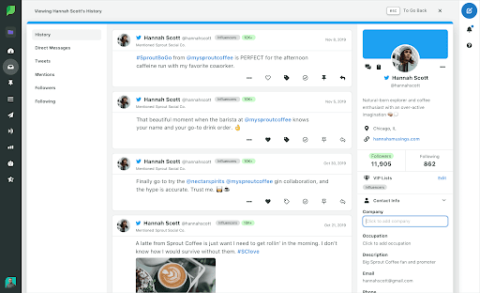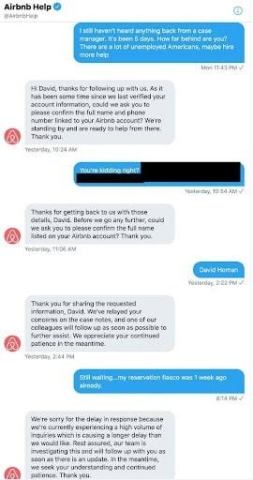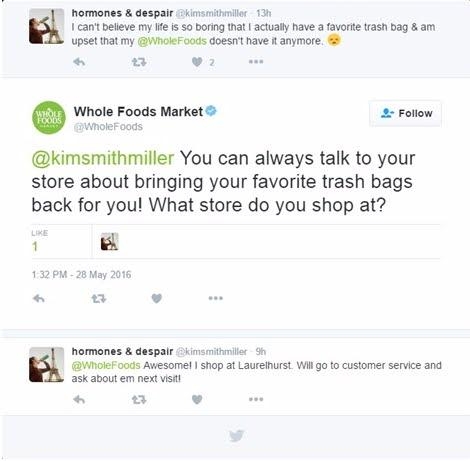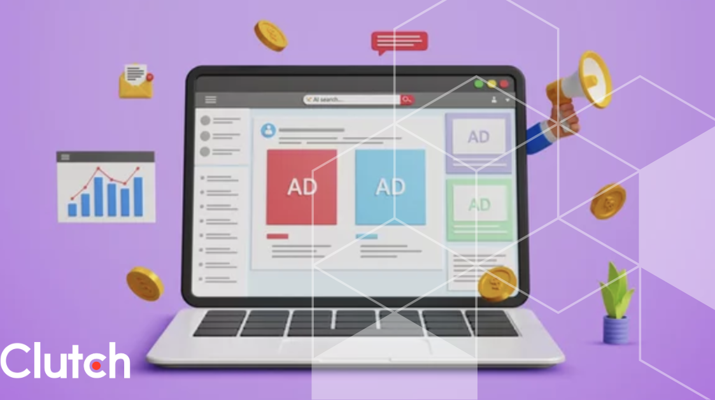

Updated January 2, 2025
Social CRM is a system that integrates social media data with traditional CRM software. This allows businesses to better understand and interact with their customers on social media, improving customer service, marketing, and sales.
Social media is now a key marketing channel for businesses.
Social media networks are where many businesses have meaningful interactions with customers. Rather than a one-way communication directed by brand owners, social media enables two-way conversation in real time.
With a staggering 75% of Internet users using social media to research brands and 20% using social media to share their opinions on products, companies need a robust social media marketing strategy to support their business goals.
That’s where social CRM comes in.
This article will explain why 96% of business leaders plan to integrate social data into their company’s CRM. You’ll learn what social CRM is and how it can benefit your business.
Social customer relationship management is the integration of social media channels into your CRM system, allowing you to leverage social insights to manage and nurture relationships with customers.
As you know, CRM (customer relationship management) refers to strategies, processes, and software that track phone calls and email interactions with leads and customers. Businesses enhance customer engagement with CRM tools that provide visibility and data access to sales, marketing, business development, and customer service departments.
The result is a better customer experience and increased employee productivity.
Historically, though, social data was separate from the customer’s contact details and purchase history. So, if a customer left a review on Instagram or TikTok, the business could not connect this information with its overall business strategy. This is where social CRM comes in.
The key features of social CRM are:
Here’s an example of a customer's profile in a social CRM platform.

In addition to personal information, users can access the customer’s interaction history, direct messages, mentions, followers, etc.
Businesses have never had a wealth of customer data as they do now. More than five billion social media users login to share everything from their opinions on the latest blockbuster to customer feedback. This is information you can leverage to ensure business success.
How exactly can social CRM help your business? Here are four ways social CRM delivers value:
Social CRM supports omnichannel strategies by eliminating gaps between channels.
Customers gather information from various channels when making buying decisions. The B2B buyer journey may start at an event with pit stops on your product landing page, LinkedIn page, homepage, and Facebook conversations with your sales staff.
In other words, you can’t achieve a 360-degree view of your customer without social media integration. A Harris Poll report shows that 93% of business leaders say that social data is a primary source of business intelligence.
But why bother with this omnichannel approach to gathering data about your customer?
When businesses gain a deeper understanding of customers’ attitudes, values, and online behaviors, they can craft tailored experiences. Since relevant departments can also access all this information through social CRM, tailored experiences are guaranteed, whatever the channels the customer uses.
So, the company as a whole can also ensure an omnichannel customer experience. The result is that the customer doesn’t encounter frustrating situations like this one shared on Twitter/X:

Notice how the customer got irked because they had to repeat all the information they had already given the company case manager using a different platform.
Ultimately, these omnichannel experiences can help you generate more customers and revenue. Nearly 80% of customers prefer companies that implement these strategies. Also, omnichannel shoppers have a 30% higher lifetime value than those who shop using a single channel.
To ensure good customer service, you should be proactive. That means that you shouldn’t wait for customers to blacklist your brand for not meeting their expectations before you act. You should anticipate their needs and serve them immediately, instead of just reacting to issues as they come.
Social CRM can help this through social media monitoring. You can leverage the platform’s social listening features to identify seemingly harmless posts and address brewing customer issues before they escalate. So, if your customer service department finds a social media post by a disappointed customer like the one below, they can quickly respond and take action:

Thanks to social CRM, you can spot posts by angry customers and find ways to appease them immediately using the appropriate channels. Once your email marketing department sees a post like the one below through the social CRM platform, they can immediately email a discount code the customer can use on their next purchase, for example. Meanwhile, the social media department can issue a prompt apology.

You might even turn these angry customers into loyal ones with immediate response and action.
With social CRM, you can also gain deep customer insights into your audience's behavior from social media conversations. That allows you to personalize customer interactions proactively.
For instance, if a customer goes to your site, the customer service agent, who has access to social CRM data, can initiate a conversation based on that customer’s social media activity. So, suppose the customer clicks on your Facebook ad promoting your shoe product before going to the website. In that case, the agent can immediately offer information about that product without being prompted. This will delight the customers, with a staggering 76% of them expecting personalized communications from a brand.
Finally, social CRM also helps you anticipate demand for customer service so you can plan accordingly. Through predictive analytics, you can staff customer care teams by seasonality, ensuring enough coverage during high volume periods.
Collaboration between various business teams doesn’t just revolutionize customer experience. It streamlines internal workflows.
For instance, email marketing teams can leverage social CRM to quickly create emails based on a customer’s social media activity. They won’t have to waste time calling their social media counterparts for relevant customer data to create this tailored content. If the social CRM shows a user shared a company social post about its newest shirts, for example, the email marketing department can automatically focus on sending that same customer emails that provide information about that specific product line.
That also means they won’t have to waste their time crafting messages about the company’s other products that might not interest the customer. Based on the same social CRM data, including the email marketers’ sent messages, the sales team can, for their part, target their sales efforts and instantly offer special discounts on these T-shirts to increase the chances of the consumer making a purchase.
In other words, thanks to social CRM, you ensure all departments work like a well-oiled machine toward the same business goal – without being constantly prompted.
The result is increased productivity and targeted efforts, resulting in higher returns on investment.
Social media platforms are a gold mine for lead generation. Remember, there are 5.04 million daily social media users, and your target audience is among those.
Social CRM supports lead generation by automating workflows triggered by specific social media activities. So, if someone shares your post, sends you a DM, or downloads an eBook from a social ad, you can automatically add them to your contact list. That means your marketing and sales reps won’t have to perform all the manual work associated with prospecting and building lists of qualified leads. They can focus on converting these leads instead.
Therein lies the other benefit of social CRM. CRM software ranks prospects to determine how likely a potential customer will convert. When integrated with social media, it can use valuable social data to let you know if certain individuals can be converted into customers in the first place. For instance, if you’re a B2B company, social CRM can look at prospects’ job titles on their social profiles and tell you if they are company decision-makers you can convince to buy. It can also look at a prospect’s level of engagement with the company’s content for the ranking.
Sales staff can then prioritize these promising leads, increasing the likelihood of higher conversion rates.
Your customers go on social networks to share their opinions about your brand. However, these valuable insights have limited application if marketing, sales, or other business teams can’t access them.
Social CRM streamlines the delivery of social data so your business can connect and interact with customers better.
This post made a strong business case for social CRM. We cited four key benefits of integrating social data into customer relationship management. You can expect a 360-degree view of your customers, improved customer experience, increased worker productivity, and more qualified leads.
Hopefully, these convince you of the value social CRM helps extract from your social media presence. With the right social CRM, you can, ultimately, ensure your business growth.


